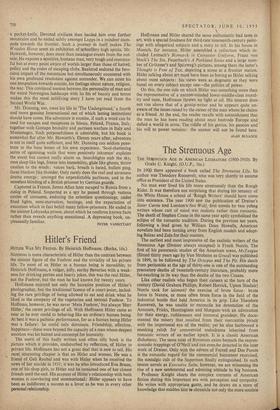Hitler's Friend
HITLER WAS MY FRIEND. By Heinrich Hoffmann. (Burke, 16s.) NOTHING is more characteristic of Hitler than the contrast between the sinister figure of the Fuehrer and the triviality of his private life. To most of us Hitler as a human being is incredible; to Heinrich Hoffmann, a vulgar, jolly, earthy Bavarian with a weak- ness for drinking parties and hearty jokes, this was the real Hitler, not the Fuehrer, but the man he had known for twenty years.
Hoffmann enjoyed not only the lucrative position of Hitler's photographer, but the traditional licence of a court-jester, includ- ing the rare privilege of being allowed to eat and drink what he liked in the company of the vegetarian and teetotal Fuehrer. To Hoffman, however, he was never 'Mein Fuehrer,' but always 'Herr Hitler,' the rarest privilege of all. With Hoffmann Hitler came as near as he ever could to behaving like an ordinary human being. At best it was a pathetic performance, for as a human being Hitler was a failure: he could only dominate. Friendship, affection, happiness—these were beyond the capacity of a man whose deepest emotion was his hatred and contempt for humanity.
The merit of this badly written and often silly book is the picture which it provides, undisturbed by reflection, of Hitler in private life. Hoffmann has not a great deal that is new to tell. His most interesting chapter is that on Hitler and women. He was a friend of Geli Raubal and was with Hitler when he received the news of her suicide in 1931; it was he who introduced Eva Braun, one of his shop girls, to Hitler and he remained one of her closest friends until the end. His account of Hitler's relationship with both women is convincing and unsensational: Hitler appears to have been as indifferent a success as a lover as he was in every other personal relationship. Hoffmann and Hitler shared the same enthusiastic bad taste in art, with a special fondness for third-rate nineteenth-century paint- ings with allegorical subjects and a story to tell. In his house in Munich, for instance, Hitler assembled a collection which in- cluded Lenbach's Bismarck in Cuirassier Uniform, Franz von Stuck's 7'he Sin, Feuerbach's A Parkland Scene and a large num- ber of Griitzner's and Spitzweg's pictures, among them the latter's Thought is Free of Tax, depicting a scene at a frontier station. Hitler talking about art must have been as boring as Hitler talking about most subjects : his views were as dogmatic as they were banal on every subject except one—the politics of power.
On this, the one side on which Hitler was something more than the representative of a narrow-minded lower-middle-class moral- ity and taste, Hoffmann throws, no light at all. His interest does not rise above that of a gossip-writer and he appears quite un- aware of the issues raised by the career of the man whom he claims as a friend. At the end, the reader recalls with astonishment that the man he has been reading about once bestrode Europe and defied a world in arms. The riddle of his genius, his passion and his will to power remains : the answer will not be found here.
• ALAN BULLOCK










































 Previous page
Previous page